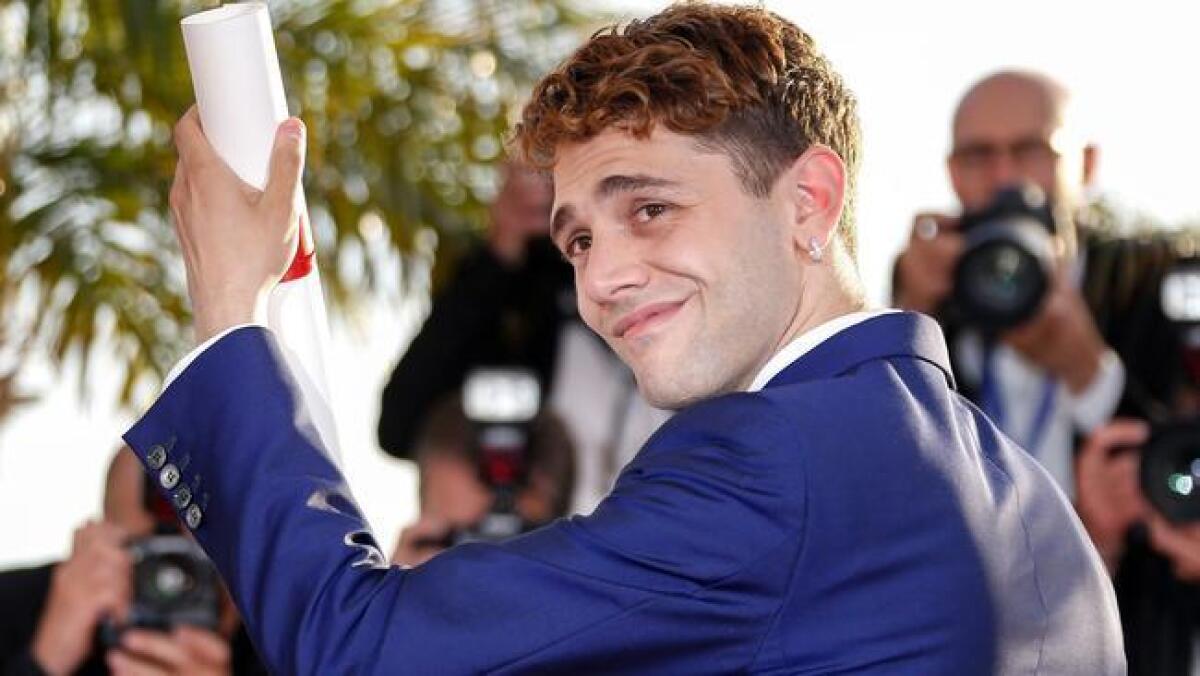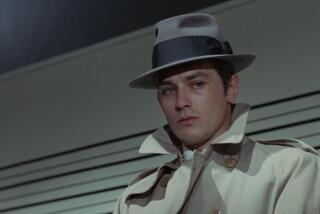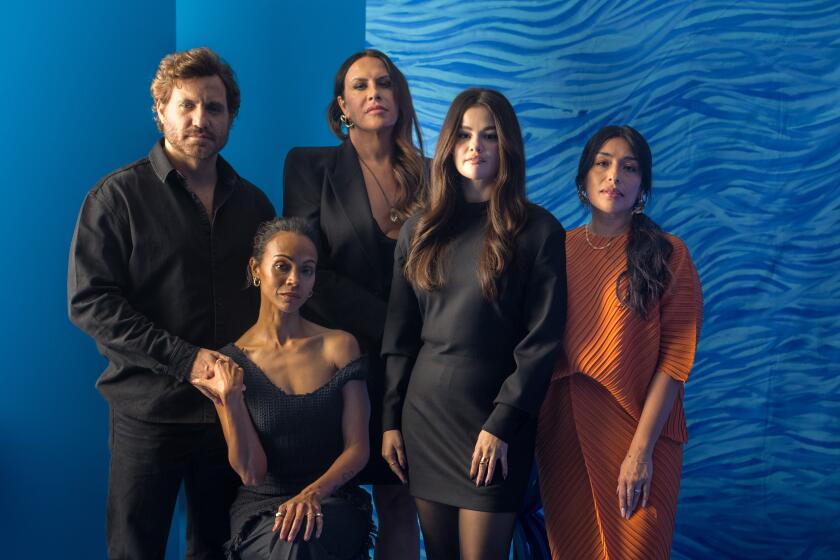As he shoots for awards attention, Canadian director Xavier Dolan is still taking no prisoners

When Xavier Dolan last offered his thoughts to The Times, he was feeling pretty roughed up by reviews for his coming-home drama “It’s Only the End of the World.”
The French-Canadian auteur’s film premiered at Cannes, where the reactions were swift and often merciless — decrying, among other things, a shrill tone and in-your-face dysfunction. Dolan took particular (understandable?) offense at assessments he felt were unduly personal and a mentality he thought was unfairly lemming-like. “This is not journalism. It’s gossip. It’s pretending to be a sophisticated analysis, but really it’s cheap psychology,” he said. It was one of a number of blunt comments he made during the conversation.
Some things have changed in the seven months since. More than some, actually.
Dolan’s movie — an adaptation of the late Jean-Luc Lagarce’s play about a young man who returns to his combative family bearing news — won the prestigious Grand Prix on the Croisette just several days after that candid conversation. The film, which stars the likes of Marion Cotillard and Vincent Cassel, then elicited warm receptions at the AFI and Toronto festivals, the latter of which named the film to its annual Canadian top 10 list.
Canada also selected “World” as its official foreign-language film Oscar submission, which means the movie is eligible for one of the year’s most venerated prizes.
And when the Golden Globes announces its foreign film nominees Monday morning, it’s not out of the question that the drama ends up on the Hollywood Foreign Press Assn.’s short list.
You might expect Dolan, 27, to have reveled in all this good news. Or, at least, to have put the sting of those festival reviews out of mind.
You probably wouldn’t know the director then.
“Not really,” he said matter-of-factly in a phone interview from Montreal last week when asked if any of this brought a sense of validation. “It does not alleviate the shock of being collectively dismissed by a group of people all at once, and basically in the same fashion. Nothing can prepare you for that.”
He continued: “I know I should forget about it and say it’s all part of the game and start anew. But I’m just too emotional to do that. I’m probably not mature enough to do that.”
Dolan made a name for himself when, while just a teenager and in his early 20s, he began creating a quick succession of French-language, Freudian-layered movies such as “I Killed My Mother,” “Tom at the Farm” and his 2014 breakout, “Mommy.”
He showed himself to be a filmmaker of prodigious talent, with a distinct style and a knack for ending up in the headlines. Dolan’s films sported a Banff-size heart, the kind of feelings-happy characters that divide audiences — he’s either fearlessly taking big emotional cuts or he’s schmaltzily aiming for the largest reactions, the responses go.
But few reactions were like those at Cannes this year, which from the get-go criticized the discomfort some viewers felt watching the cameras cut between extreme close-ups of an unhappy family in the Quebec home of prodigal artist Louis (Gaspard Ulliel). In a typical review, the writer Catherine Bray, in Time Out London, called the movie a “screeching melodrama” that offered “scant sense of who any of these people are or why it might be interesting to spend time with them.”
Dolan said he couldn’t resist a preoccupation with those notices. “The world wants you to focus on what’s positive. But you can’t focus on things that don’t exist. That’s just the person I am.”
Depending on your point of view, Dolan is either endearingly vulnerable or hopelessly narcissistic. (This reporter believes the former, but make up your own mind.) He says that the public makes unrealistic demands of its directors — they want honesty, but only on the screen.
“If I relinquished that emotionality in interviews, then I would be giving up what I love to put into films, which is emotion. I can’t just be emotional in films and then turn it off in interviews in the rest of my life and pretend I’m cool with everything.” Then he added, ruefully, “I’m just not good at this.”
The filmmaker’s case highlights a particular, often unspoken side of the contemporary artist. With the explosion of so much media — legacy, digital, social — the pressures on creative sorts are greater than ever. But the release valves for such emotions are far fewer. Directors are expected to toe the line and speak ill of no one — certainly no one (such as a studio or critic) who can hurt them.
Dolan offers a kind of throwback, a reminder of a time when directors didn’t curtail their behavior or speech because of potential reactions. Which is easier said than done — he is, after all, living at a time when such candor can be known, and judged, by a far greater number of people.
Still, he does have a point when he notes the reaction to the prize for “World.” “I mean, it was called the worst decision Cannes has made in more than 20 years,” he pointed out.
The critical takes on the prize were indeed no more enthusiastic than the response to the movie. The Times’ Justin Chang called it well, pretty much what Dolan said. (“In my 11 years of attending Cannes I cannot recall a worse jury decision than this one,” to be precise, going on to label the film a “badly shot, shrilly performed and all-around excruciatingly misjudged dysfunctional-family torture session that felt far longer than its 97-minute running time.”
Even Dolan’s Cannes acceptance speech — a soul-bearing talk about a friend — was polarizing. It led him to a reckoning that anyone who has waded into social-media waters, from whatever end of the pool, could well relate to.
“Later that night friends said, ‘Don’t read anything.’ And of course I did,” he recalled. “And all I could see were professionals inviting the public to meme-ify me and make montages of reactions to the jury members next to my speech.”
He paused. “I don’t know what this profession is about sometimes — what are we seeking? What is this search? What kind of art are we making? What is this search for hatred and popularity on social media? And what am I going to do, I who love criticism — a really well-written piece of movie analysis — what am I going to do if the climax of the journey is this? These tweet wars and comments straight out of ‘Mean Girls’?”
He said this presented not just an issue for him but should also concern anyone who cares about cultural discourse.
“We need reviews. We don’t need diagnoses; we don’t need shrinks. Social media is blurring the line between opinion and analysis,” Dolan said. “And the worst outcome of this is a very personal reviewing not of work but of personalities.”
Dolan did allow that the film could test some viewers’ patience, wherever they happen to be.
“I know this atmosphere is intolerable and insufferable for a lot of people,” he said. “I just personally don’t see it. They’re aggressive, they’re violent, they’re harsh and cruel. But I love that. When someone yells at me in a family situation my instinctive response is: Interesting; what’s with him?”
(French reviews, it should be noted, were stronger, while the Guardian’s Peter Bradshaw, in a notably outlying English-language review, gave the movie four stars and said the claustrophobia had a rich effect in the context of a family drama. “ ‘It’s Only the End of the World’ is confrontational absurdism: a fascinating, sustained assault.”)
Particularly lodging in his craw is the fact that “World” never attained U.S. distribution. He squarely blames the Cannes reviews for this. Dolan’s film will barely even see the digital light of day in this country — “maybe Netflix, in like a year or two, or never,” he said dolefully.
“World” aside, the filmmaker has generally not had the kind of traction on this side of the border that he’s had in his home country or across the pond. His movies are not just in a foreign language but of a foreign sensibility, a brand of melodramatic expressiveness that’s mostly favored by European audiences.
At the time of the Cannes craziness Dolan expressed ambivalence about the filmmaking profession and even hinted he might retire. Those fans aghast at the suggestion — or critics happy about it — need not be concerned/cheerful.
After the festival, Dolan returned to Montreal, where he began shooting “The Death and Life of John F. Donovan.” It tells a story about the combustible correspondence between a young boy and a Hollywood actor. The film marks the Quebecer’s first English-language project and features stars such as Jessica Chastain, Susan Sarandon and Natalie Portman. Dolan has shot the first half, which he is currently editing; the latter section will be shot early in the new year, with an aim to debut at a festival and land a U.S. distributor later in 2017.
After that, Dolan could be even more visible: He says he’s currently writing a new movie, “Pornhead,” about an underachieving man in his late 20s. It’s his first film explicitly about a father-son relationship. “I just wanted to talk about the violence of men,” he said. “The violence we’re inherently born with. How we decide to express it, to exude it, to suppress it — the affect it has on our lives and on our society.”
And it’s the first in which he stars, since he’s writing the lead part for himself to act in. Dolan will be front and center, as he somehow — to the delight of his fans and annoyance of his critics — often manages to be.
See the most-read stories in Entertainment this hour »
On Twitter: @ZeitchikLAT
More to Read
Only good movies
Get the Indie Focus newsletter, Mark Olsen's weekly guide to the world of cinema.
You may occasionally receive promotional content from the Los Angeles Times.










